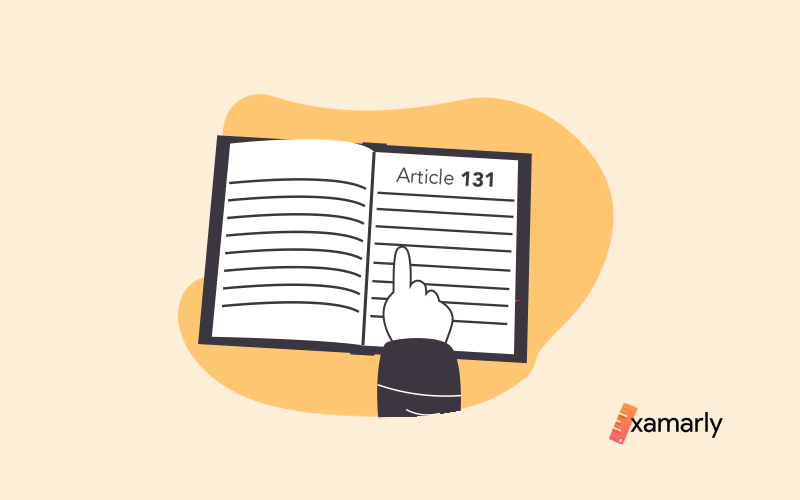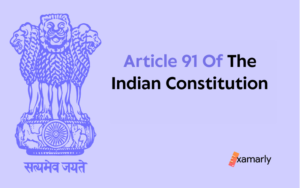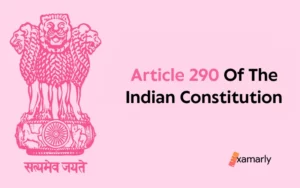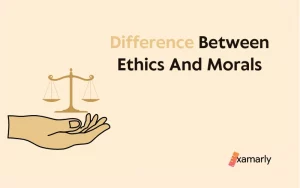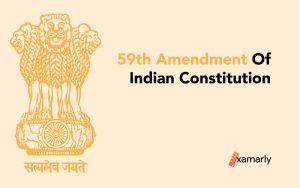Are you wondering what Article 131 of Indian Constitution is and why it is important? If so, you’ve come to the right place.
Article 131 of Indian Constitution has been evoked every now and then when States or any form of government feel the need for Supreme Court intervention in the question of law. This raises a substantial question of authority between states, government, and the Court.
In this article, we’ll explain the importance and the core principles of Article 131 of the Indian Constitution and what it means for India’s political system. In addition, we will explore how the constitution was drafted in such a manner that it upholds the principle of secularism at every interjection.
- Article 131 Of Constitution Of India: Original Jurisdiction Of The Supreme Court Of India
- Need For Article 131 Of The Constitution Of India
- Importance Of Article 131 Of Indian Constitution
- Can States Challenge The Validity Of Central Laws?
- Can The States File An Original Suit Under Article 131?
- Can States Oppose The Implementation Of A Central Law Under Article 131?
- Conclusion
Article 131 Of Constitution Of India: Original Jurisdiction Of The Supreme Court Of India
According to Article 131 of Indian Constitution, the Supreme Court of India has exclusive jurisdiction over disputes between the Union and the state governments. The dispute must concern a question of law, fact, or legal right.
However, the Court cannot hear an individual case. The article specifically concerns questions and disputes arising between and hence caters to cases between the Union and a state. For further information, read the section below containing the full text of Article 131 of the Constitution of India.
Article 131 of the Indian Constitution gives the original jurisdiction to the Supreme Court of India in any dispute between:
- The Central Government of India and one or more States;
- The Government of India and any State(s) on one side, and one or more States on the other;
- Two or more States, if and insofar as the dispute includes any questions (whether of law or of fact) on which a legal right’s existence or extent depends
- Any two or more States on one side and the Union of India on the other.
The basic structure of this Article is woven around the term ‘original jurisdiction. Original jurisdiction refers to the power of the Supreme Court of India to decide disputes between the central government and states. The originating jurisdiction of the court lies in the Constitution of India.
If a state is the dispute’s party, then it is the state that has the right to request the court to settle the matter. The courts can rule on a wide variety of legal issues. A center-state dispute is the most common among these in this period of time. The primary jurisdiction of the Supreme Court is on domestic disputes, but it also has a broad mandate to hear international commercial disputes.
The Supreme Court holds three distinct branches of jurisdiction: original, advisory, and appellate. Its original jurisdiction covers disputes between the federal government and states, as well as disputes between individuals pertaining to legal rights.
As an independent court, the Supreme Court is also a powerful tool for resolving disputes. It is also empowered to make a final decision in certain cases. This power extends beyond the common law, as it is uniquely qualified to decide such cases.
The Apex court of the country, the Supreme Court of India, is the final authority in all matters. Its judgments are final and binding on the lower courts. It is an important part of the Indian legal system.
With respect to constitutional violations of human rights, the Supreme Court can intervene in the legal proceedings. A court may be able to determine the jurisdiction of a state by reviewing a case from another state.
The jurisdiction of the Supreme Court
The jurisdiction of the Supreme Court can be classified as:
- Original Jurisdiction
- Writ Jurisdiction
- Advisory Jurisdiction
- A Court of Records
- Appellate Jurisdiction
- A Power of Judicial Review among other powers.
Also Read: Advisory Jurisdiction Of Supreme Court
Jurisdiction Of The Supreme Court Does Not Extend
Jurisdiction of the Supreme Court does not extend to:
- Any legal dispute that surfaces due to a treaty, agreement, covenant, engagement, or other similar implements which were made into effect before the constitution and continues to be in operation
- Any case that caters to the use, control, or distribution of the water resulting in disputes over any inter-state water bodies
- Any complaint filed by independent individuals against the Indian government.
- Any matter referring to the Finance Commission Laws under Article 280.
Need For Article 131 Of The Constitution Of India
In the quasi-federal system of the country, Article 131 is very crucial in upholding the fundamental rights of all citizens. It deals with issues that arise when the state and the Centre disagree, and specifies who has the final authorial agency.
The Supreme Court is the highest judicial authority, so any infringement of legal rights by either entity is grounds for a challenge. Moreover, Article 131 gives states an avenue to raise questions of interpretation of the central laws. That is why Article 131 is so essential for the Indian governing system.
The motive of Article 131 is to limit the scope of cases to those involving legal rights and obligations and not merely disputes between the two.
According to Salmond, a legal right is an interest protected by the rule of law. It would be illegal to violate that right, and so, the obligation of respecting that right is fundamental to the rule of law. However, this clause does not guarantee that the Supreme Court will be the only instance that can hear such cases.
Article 131 of the Constitution of India gives the original jurisdiction to the Supreme Court of India to hear conflicts between the Union government and one/two or more states about any of the following:
- the interpretation of the Constitution;
- the enforcement of a fundamental right;
- the determination of the question of whether an Act of Parliament or of the Legislature of a State is ultra vires;
- any other matter which may be directed to it by the President of India under Article 132(1).
Importance Of Article 131 Of Indian Constitution
The Importance of Article 131 of the Indian constitution is that it provides a venue for disputes involving the Union Government and a state. The article states that disputes concerning the legal rights of a state may be heard in a court. However, it does not specify which kinds of disputes fall under its ambit.
Therefore a question of legality arises. Judicial interpretation and facts of a case will determine whether a dispute falls within the ambit of Article 131.
While Article 131 is anathema to the Government’s slogan “cooperative federalism”, its framers were aware that there would always be disagreements between the Union and its constituent states.
Moreover, in many cases, the Government of India might end up with the authority to bypass the judicial hierarchy in a conflict between two states.
The Supreme Court of India has original and exclusive jurisdiction to decide on such disputes. Therefore, the Supreme Court has the authority to override the lower courts in disputes between the Union and states.
Let us briefly look at the importance of Article 131 of the Indian Constitution below:
Federalism: Article 131 helps resolve disputes between a state and the federal government or between two states. The intention of the constitution’s creators was to foster the federal system of Indian politics by underlining the federal nature of Indian society.
Check on Centralization tendency: Central laws cannot enact anything that encroaches on or interrupts the state’s legal rights. Article 131 of the Constitution provides legal consequences for any such actions and protects the citizens against unchecked legislative power.
Remove States Dissatisfaction: Article 131 allows states to go to the apex court to try to remove their discontent with the Centre’s decision. It shows them the way to go about doing it and inculcates trust in judicial power.
Legal Rights of the State: It says in Article 131 of the Constitution that if a State feels its legal rights or the fundamental rights of its citizens are in jeopardy or that there’s been a violation, it can contest the matter to the Supreme Court. It keeps the States’ legal rights intact.
Cooperative federalism: By permitting conflict resolutions in different forms, such as federal or between states, cooperative federalism enables these disagreements to be worked on more comprehensively.
Can States Challenge The Validity Of Central Laws?
Supreme Court sits at the apex of the judicial branch, which has the authority to review all laws passed by the Indian Parliament. That being said there have been various cases where Article 131 was invoked to challenge central laws and many cases where this request was discredited.
There are some conditions that ascertain whether states can object to the validity of central laws. Let us look at a few milestone cases that discuss this aspect of the Constitution.
The State of Madhya Pradesh V. Union of India and Another of 2011: The Supreme Court decision stated that while central laws can be questioned in state high courts and the Supreme Court under Article 32, their constitutional validity cannot usually be challenged under Article 131. The emphasis here is on the term “constitutional validity”
In another scenario, in the State of Karnataka Vs. Union of India brought forth the decision that there must be one condition for the state to challenge central laws at the apex court. There was only one condition – a dispute between two parties must include a question relating to the existence or extent of a legal right.
In the State of Jharkhand vs. the State of Bihar, Article 131 was proclaimed as a suitable instrument to test the Supreme Court’s central law constitutionality. Again, a condition that came into the discussion was that for citing the court’s jurisdiction as per Article 131 it is necessary that the dispute should include a question of the existence or range of a legal right and not a political one.
To summarize, yes, the state can object to the validity of central laws by appealing to the Supreme Court as per Article 131 of the Indian Constitution. States can question central laws of any legal right guaranteed by the Constitution are being violated. The emphasis here is on legal laws. Additionally, the State cannot question any central laws on an ideological or political basis.
Can The States File An Original Suit Under Article 131?
Yes. But there are some debates that need to be taken into account. Let us take the example of a few cases to better understand this.
The first suit that was filed under the original jurisdiction of the Supreme Court was by the West Bengal Government. They have filed a case pertaining to the legal rights of mines in coal-nearing areas against the central law namely the Coal Bearing Areas Acquisition and Development Act of 1957.
However, the Supreme court dismissed this suit and upheld the authenticity of the central law.
The Supreme Court has ruled twice on whether a State is entitled to challenge the constitutionality of central law under Article 131.
- The first verdict was reported in 2012 in the State of Madhya Pradesh vs Union of India case which held that, under Article 131, the States cannot challenge a central law.
- The Supreme Court took an entirely opposite turn in 2015 when the State of Jharkhand Vs State of Bihar case was directed to a larger bench of the Supreme Court for final determination. This case is still awaiting the final verdict.
Can States Oppose The Implementation Of A Central Law Under Article 131?
That is again a substantial question. The Indian Consitution’s federal framework is such that the States are required to follow the Central Laws. In such a case, any failure to comply resonates badly upon the system as a whole and thereby represents the collapse of the constitutional machinery.
In this situation, a question of legality arises. Hence, Article 256 of the Indian Constitution specifies that “the executive power of each state must ensure compliance with the laws passed by the Parliament.”
On the other side, if there is negligence to act in accordance with a central law from the State, then according to Article 365, the President has the authority to hold that a situation has surfaced in which the State government cannot be carried on with regards to the Constitutional provisions.
There is a recent case that is relevant to the debates on the legal power of a government. The Pinarayi Vijayan-led LDF Government invoked Article 131 of the Indian Constitution while moving against the Citizenship Amendment Act of 2019.
While the state did argue that the Citizenship Amendment Act hinders or violates the fundamental rights of its citizen, this does not cater to a legal right. Further, it concerns individuals. So, the best way out is to challenge the same under Article 32 of the constitution, which has already been done.
Conclusion
To summarize, Article 131 of the Indian Constitution deals with important questions of law and the validity of the constitution, not those based on politics. The easiest way to achieve this is to ensure open and vocal relationships between leaders of parties about their stances when the laws are being modeled, and to avoid creating a problematic issue later on.
In this matter, the State and the Centre must understand that federalism is a two-way street. They must respect the constitution and each other.
If individual states refuse to comply with central legislation, then the central political machinery will cease to function. While Article 131 is very useful in certain cases, it is not applicable to every case.
The Constitution defines a state differently from that defined in article 12. The Court takes into account only legal rights and not political rights. If a state violates an individual’s legal right, it is guilty of a legal wrong.
The state must respect this basic right. Otherwise, the court will rule against the individual. It is crucial to remember that Article 131 is not a substitute for judicial review in all cases.


